Sometimes inspiration comes from dark places.
As I imagine many writers–especially writers of speculative fiction–do, often I use my writing as a tool to process and cope with things in the world beyond my control. As a trained social scientist with degrees in history, anthropology, and political science, I view the world through a unique lens, one even further shaped and refracted by my identity as a writer, by my gender and my sexuality, by my sociopolitical and spiritual beliefs, by my morality and my upbringing. Each of us carry these things as we approach the world.
I’m going to talk about Skypoint here, but there are themes woven into most of what I’ve written that draw from my perception of and reaction to the world around me. In a lot of scenarios, some of those themes are not terribly hard to find and in others they’re more subtle.
Skypoint, as I am currently envisioning it as I work through the writing of the first draft, is one of those works that draws on a lot of darker inspirations. Spoiler warning, if you don’t want to know what I’m planning for the book in either vague or precise terminology, stop now and move on.
Still here? Okay.
Skypoint delves into themes around bodily autonomy, secrets, conspiracy, and war–it addresses the lengths governments will go to to protect secrets and to gain the upper hand in conflict, the lies that are sometimes told to justify actions, and who has the right to do certain things. In the book as I’m writing it now, and the wider world surrounding it (currently planned to adjust some of the history of Legacies of the Lost Earth while telling at least part of the story of how Earth was lost in the first place), there’s a question of who has the right to make decisions for another individual about their mind and health, about their very bodily autonomy and agency. This is mostly depicted through the handling of people with psychic gifts (a theme that I obviously play with fairly often), but anyone who’s read the Legacies so far knows that it goes further and deeper than that–Alana Chase of the Legacies being a prime example. David Lésarte and Hunter Drake are further examples in Skypoint, as both were offered very limited options when it came to their futures–at varying points in their lives, both before and after we meet them in the story.
So, too, does the question of justification for war and how they happen come up in the world. Sometimes there are secrets that are kept so conflict can continue to be justified–and sometimes, as a pretext for conflict in the first place. Admittedly, when I began working on Skypoint, there 2022 invasion of Ukraine by Russia hadn’t started, though there was still the memory of 2014 and Crimea. Neither of these were on my mind at the time, though, but simmering geopolitical tensions certainly were, as was my own memory of the events that led up to the US-led invasion of Iraq two decades ago. These are the things that inspire and the things that you wrestle with and sometimes, they become useful inspiration and the act of writing becomes cathartic and a mechanism of processing all of the craziness of the world.
Works like Skypoint and the Legacies and all of my other projects have a hint of this to it, except for maybe Magic Crystal Justice Squad which is definitely half tumblr-born dare and maybe half escapism born of a global pandemic.
So I guess, in a way, even that’s a coping mechanism.
Inspiration can come from dark places and dark things, but harnessing that inspiration can help a writer–or any artist–produce something beautiful and lasting, in spite of or perhaps because of its roots. Every work is the product of the time, circumstances, and influences of its creation.
Especially mine.

